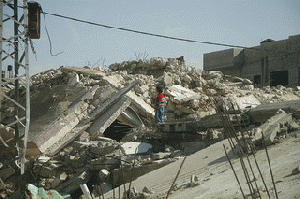For those trying to read developments between Israel and Gaza over the past weeks, the picture has been unusually puzzling.
A month ago European diplomats and Palestinian officials in the West Bank suggested that Israel and Hamas were taking "baby steps," as one Palestinian analyst termed it, towards a truce.
Then earlier this month, as an attack blamed on the extremists of Islamic State (ISIS) killed dozens in Sinai, an Israeli general accused Hamas of supplying the weapons used against the Egyptian military.
A short time later, a group of Israeli army commanders urged the easing of the near-decade blockade of Gaza as a way to end Hamas' isolation.
So what's going on? Does Israel want Hamas weakened or strengthened?
The uncertainty reflects Israel's increasingly convoluted efforts to "manage" Gaza faced with the fallout from its series of attacks on the enclave beginning in late 2008 with Operation Cast Lead and culminating in last year's Protective Edge.
International activists aboard a humanitarian flotilla failed again this month to reach Gaza and break Israel's physical siege. But more difficult for Israel is maintaining the blockade on information out of Gaza.
The problem was illustrated this month by a new app from Amnesty International that allows users to map 2,500 Israeli air strikes on the enclave last summer and interpret the resulting deaths and destruction from pictures, videos and testimonies.
The software, says Amnesty, reveals specific patterns of behavior, including attacks on rescue vehicles and medical workers and facilities.
It allows any of us to turn amateur war crimes sleuth for the International Criminal Court in the Hague, and moves nearer the day when Israeli soldiers' impunity will end.
The difficulties for Israel of controlling the narrative about Gaza were underscored last week. Judges at the Hague ruled that the court's chief prosecutor had erred in refusing to investigate Israel for war crimes over the killing of 10 activists aboard an earlier flotilla, in 2010.
The judges determined that the prosecutor, in dismissing the case as lacking the necessary gravity for the Hague court to intervene, had ignored the wider, political context.
Beyond the harm done to the passengers, Israel's attack on the flotilla delivered a blunt message to the people of Gaza and the international community: that Israel could deny humanitarian aid to the enclave by enforcing the blockade. The policy needs to be tested against the principles of international law, suggested the judges.
Not only does their ruling reopen to scrutiny the episode of the flotilla, but it puts considerable pressure on ICC prosecutors to ensure they investigate Protective Edge thoroughly too.
Meanwhile, frustration at the failure by international institutions so far to hold Israel to account is driving other ways to punish Israel, notably the grassroots boycott, divestment and sanctions (BDS) movement.
Israel is slowly losing this battle too. The US state department declared late last month that it would ignore the provision in a new trade law passed by Congress that requires the US to protect Jewish settlements from boycotts. In effect, a limited boycott has won the White House's tacit approval for the first time.
(Note: You can view every article as one long page if you sign up as an Advocate Member, or higher).






